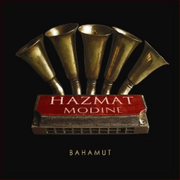
Hazmat Modine draws from the rich soil of American music of the 20’s and 30’s through to the 50’s and early 60’s, blending elements of early Blues, Hokum Jugband, Swing, Klezmer, New Orleans R & B, and Jamaican Rocksteady. The band is fronted by Wade Schuman’s harmonica and singing and includes tuba, guitar, and percussion, claviola and Hawaiian steel guitar. The band’s sound reflects musical influences ranging from Avant-garde Jazz to Rockabilly and Western Swing to Middle-Eastern, African, and Hawaiian musical styles. Occasional guests play such exotic instruments as the Chinese mouth-organ, the bass sax and the normaphone. Hazmat has found an increasingly receptive audience in Europe where were they tour a good part of the year. They backed Natalie Merchant on a few songs on her latest album. They have collaborated with Tuva’s Huun Huur Tu, the Kronos Quartet and Benin’s Gangbe Brass Band.
Their last album, Cicada (2011), reached number one on the European World Music Chart. Cicada was also nominated for a BBC award and received the Charles Cros Grand Prize in France for Best Blues Record in 2011. In addition, Hazmat Modine has a song featured in the Oscar-nominated movie “Pina” by Wim Wenders (2011), and they created and performed the soundtrack for the award-winning documentary “Windfall” (2012).
The New York Times
“The singer and harmonica player Wade Schuman’s musical vision sounds like something out of Dr. Suess. His group augments Mr. Schumans own avant-blues stylings with a contrabass, a banjitar, tuba, flugel, trumpet, sheng and, most important, Tuvan throat singing. ” Sinagra –
The Village Voice
“Seems like ages since harmonicas have sounded as hip as Wade Schuman’s and Randy Weinstein’s do in this hand-painted confab of rusty blues, piquant rumbas, sawdust-floor reggae, Hawaiian guitar, and—sure, why not?—Tuvan throat singing. Welcome to the old weird globalism.” Richard Gehr
Pitchfork.
“Generalized roots music that takes from pretty much any roots it sees fit […] true world music, weird and wonderful to the last note.” Four-star review. Joe Tangari.



